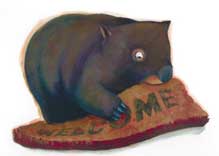How to get your first novel published
1. Rewrite it, and be really honest about it- yes, of course you can damn well
make it better, and I don't just mean changing the odd word. The first four
chapters almost ceratinly need rewriting to really drag the reader into the
narrative so they can't bear to leave it. Remember, you are writing this to
entrance the reader, not showcase your own passions and literary ability.
Not prepared to do this? Then
go no further. Literary honesty is the most important attribute of a writer-
the ability to accept your work can always be improved, and invariably needs to
be.
2. Have it both on disc so it can be emailed, and legibly printed double space
with wide margins and numbered pages. Don't bother with fancy fonts etc- they
just annoy the editor who'll do it better than you can
3. Don't bother looking for an agent unless you are already famous or the
Duchess of Windsor. Most agents only take work from those who have already been
published. But if you know one socially- or you ARE the Duchess of Windsor or
have any other reason why a publisher or agent will pick you up even though you
haven't had anything published, go to it.
4. Go to a bookshop. Have a look at six books of the same genre as yours.
Write down the publisher's address.
5. Write a covering letter. Include:
. your name and address
. a brief synopsis of the book- about 4-6 sentences. Make it as fascinating as
possible. I it doesn't sound fascinating, either rewrite the synopsis or
rewrite the book, or both
. also include in point form :
Target audience
ie this book will entrance
anyone who has loved either Winnie the Pooh or Wuthering heights
Selling points:
ie . evocation of a little known period in history
. well paced action- both physical and moral etc
6. Send it off.
According to etiquette only
send it to one publisher.
Acccording to me, bung it off
to as many as you can afford. On the other hand, if you only send it to one,
and they send back a kind letter telling you WHY they are rejecting it, you'll
get some great pointers for improvement, and you only get one bite of the
cherry- unless a publisher likes your book so much that they say, do x and why
and send it in again, there is not much point sending them abook they have
already rejected, unless it has been so drastically revised they won't
recognise it
7.wait for at least six months before sending another letter asking what's
happened to it- publishers rarely move quickly
8. If- when- it is rejected, console yourself with the thought that there are
more successfull brain surgeons than there are successful writers- and it takes
a heck of a long time to be a brain surgeon.
It is very very unlikely that
your first book will be good enough to publish. Good books need practice. Your
first book may be 95% brilliant- but that 5% lack of polish, the not quite
togetherness of the narrative structure, will make it umpublishable.
9. Rewrite the book, or write another.
Do NOT think ah, but they
rejected (insert other brilliant book here) then it became an overnight
success.
Those tales are mostly myth.
Yes, prize winning books have been rejected- but they were almost invariably
rewritten and rewritten before being sent off again.
If your book is fabulous, a
major publisher will snap it up, even if you are unknown- but only two or three
unknowns are picked up by major publishers in Australia each year.
Smaller publishing houses- who
can't pay large advances or get you overseas sales-are more likely to pick up
unknown authors. Some of these go on to have brilliant careers; others fade
away after their first, unsuccessful book. In other words- the smaller the
publishing house, the better chance you have of publication.
But if it's a brilliant book,
go for the bigger publishers like Penguin and Harper Collins/Angus and
robertson or Allen and unwin
10. Do not send me the manuscript.(sorry!)
a. even if I adore it, it will still have to go through the publishing process
b. .People get nasty when I don't adore their books and either tell them it
doesn't have much chance, or suggest ways to rewrite it.
Only one person has ever
thanked me for this, or followed my advice, though others have threatened me
with court action if I 'steal their ideas' or publish their story under my
name. As it takes a lot of time and energy to read a manuscript, and even more
to work out ways to improve it, I've given up this extremely thankless task.
(Actually I suspect the one
person who thanked me and really worked to improve her book- even though it
still hasn't been published-will turn out to be a stunningly successful writer
in a few years. Maybe it's just that the worse a writer is, the more they are
convinced nothing can possibly improve their brilliant work).
c. I get over 3,000 letters to answer a year, about 200 requests for free
talks, workshops or openings a year, at least once unsolicited manuscript a
week, and I only have two eyes, one brain and two hnads, all of which are aging
rapidly
ps there are manuscript assessment services, who you can pay to give you advice
on your book. But as you are asking them for at least three days work, you'll
be paying a few hundred dollars for their trouble.
|


![]()


